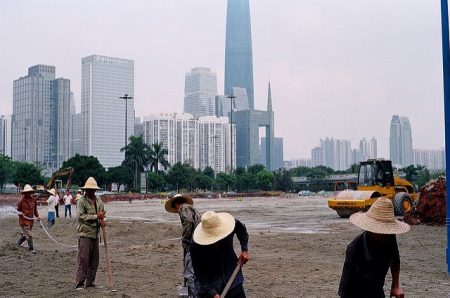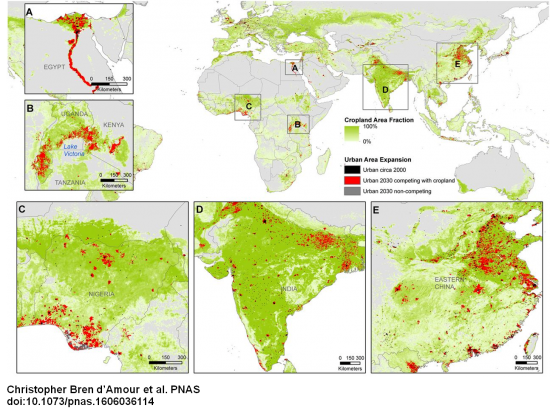January 25, 2017 – The rapid expansion of Asian and African cities, fueled by rural to urban migration will have a significant impact on croplands and yields by 2030 states a new study appearing in the Proceedings of the National Academy of Sciences of the United States. The loss represents as much as 2.4% of arable land. Cities will encroach on farmland that is twice as productive as the average farm. The lost farmland is responsible for up to 4% of global crop production.
The study is a collaboration of researchers located at the Technical University of Berlin, Canterbury University, New Zealand, University of Maryland, Stockholm University, Texas A&M, Alpen-Adria University, Austria, Yale University and the Mercator Research Institute, Berlin.
The authors point to the fact that there is “little scientific understanding of how global patterns of future urban expansion” affect cultivated areas. They hope this contribution establishes a better understanding of the urban impact on agriculture and food production. It is the rise of mega-urban regions, cities with populations greater than 10 million that because of growth impact not just land use but the local climate.
Africa and Asia are the most likely areas where these mega-urban phenomena represent significant challenges to their countries. Farms in proximity to these cities are important for growing food. In the study the loss of croplands, defined as the land covering 12% of the planet excluding pastures, is looked at using three scenarios of urbanizations.
The study calculates that in 2000, 36% of urban areas were used for food production. In high and medium scenarios these areas are expected to decline by as much as 80% producing an overall 3% African and 6% Asian cropland losses. The most impacted areas (see maps below) include Egypt, Nigeria, the Lake Victoria Basin in East Africa, the Bohai Economic Rim (the region surrounding Beijing, Tianjin, Hebei, Liaoning and Shandong) and the Yangtze River Delta, China and Java Island, Indonesia. Urban areas in India and Pakistan will also see cropland decline. The greatest impact will be on small farm holdings.
States Felix Creutzig, Infrastructure and Transport Group, at the Mercator Research Institute, “on the one hand, there is agricultural land consumed by urbanization, and on the other, new land for agriculture will possibly replace forests or other valuable ecosystems at relevant scales.” Forest loss in places like India and Pakistan has local climate implications as well as the potential to weaken summer monsoon rainfall.
University of British Columbia professor, Navin Ramankutty, comments on the issue of food security. Not a participant in the study, he states, “I think this is going to be context dependent. Whether we have food security issues in cities depends on how dependent the city is on locally produced versus imported foods, and also the bio geography that the city is located in.”
The authors of the study state, “To meet the twin goals of urban development to house the growing urban population and preserve prime cropland, it will be imperative to guide and shape future urban expansion to more sustainable forms.” That is not currently happening in places like china where despite safeguards and edicts from government, agricultural land continues to be lost to urban encroachment.
In conclusion the study quotes S. P Seitzinger et al., from a published study entitled Planetary Stewardship in an Urbanizing World: Beyond City Limits, Stockhom University, which states, “Urban regions must take an increased responsibility for motivating and implementing solutions that take into account their profound connections with and impacts on the rest of the planet.”










